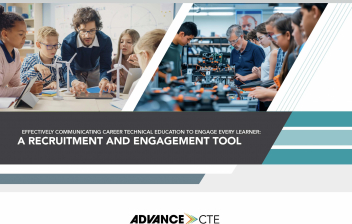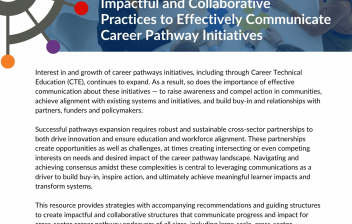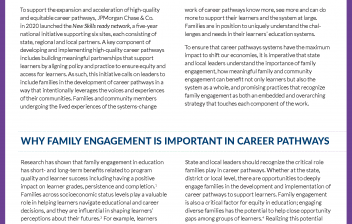A number of our partners are engaging in research to help advance Career Technical Education (CTE); below is a sampling of some compelling and ground-breaking research from other national organizations and agencies and research institutions.
2015
- State Strategies for Financing Career and Technical Education
Prepared by the National Center for Innovation in Career and Technical Education for the U.S. Department of Education
The study focuses primarily on how state funding is distributed to local secondary and postsecondary programs. The report used survey data collected by Advance CTE that asked State CTE Directors how categorical funds were distributed during academic year 2011-12, as well as the use and perception of performance-based funding for CTE. The survey found that state approaches to CTE funding varies in emphasis and complexity, and no single approach will meet the needs of every state. The study also called for more research to better understand what impact, if any, the each of the state funding approaches has on program and student outcomes.
2014
- Opportunities & Options: Making Career Preparation Work for Students
The Council of Chief State School Officers
Over 2014, CCSSO convened a task force of chief state school officers, state CTE directors and key national partners to create recommendations for supporting career readiness and career education for all students. This report is the result of that work and offers recommendations in the following three areas: employers as a lead partner in defining pathways and skills, setting a higher bar for quality of career preparation programs, and making career readiness matter to schools and students through accountability systems.
- The Progress of Education Reform: 2013
Education Commission of the States
Vol. 15, Issue 2 of the Education Commission of the States (ECS) reviews policy action from across the nation, concluding that, in particular, states showed a heightened, bipartisan interest in expanding CTE programs at both the secondary and postsecondary level. Stressing the need for high-skill workers, the ECS report reveals that states have increasingly come to see CTE as the cost-effective path to a skilled workforce and the economic development that talented workers invite.
- Innovation Imperative: Enhancing the Talent Pipeline
Northeastern University
This report explores concern among American employers that our education system prepares too many graduates who are unprepared for the modern workplace. It explores common themes in the critiques offered by business leaders around the nation and prescribes several possible solutions, including an expanded role for CTE at both the secondary and postsecondary level.
- Where Value Meets Values: The Economic Impact of Community Colleges
American Association of Community Colleges
The American Association of Community Colleges report quantifies the value of community colleges in terms of economic impact (i.e., to the national economy) and return on investment (i.e., to individuals and society). In addition to the report, AACC has created some issue-specific fact sheets on the value of community colleges.
2013
- 21st Century Educators Developing and Supporting Great Career and Technical Education Teachers
The Center for Great Teachers and Leaders
This special issues brief provides an in-depth analysis of three human capital management policies that are critical for CTE teachers: certification, performance evaluation and professional development.
- The Progress of Education Reform: Career/Technical Education: Not Your Father’s Vocational Education
The Education Commission of the States
This issue brief describes factors that have increased state policymakers’ interest in CTE, and presents diverse incentives used by states to promote CTE.
- Dual Credit and Exam-Based Courses in U.S. Public High Schools: 2010-11
The National Center for Education Statistics
This report provides a look at national data from the Fast Response Survey System on dual credit courses, eligibility requirements for enrolling in dual credit courses, the types of instructors in dual credit courses, and expenses paid by students and their parents.
-
Career Readiness Assessments Across States: A Summary of Survey Findings
The Center for Education Policy
This report describes how states are defining career readiness and which assessments states and districts are using to measure this attribute, based on a survey of State CTE Directors.
2012
- Career and Technical Education: Five Ways that Pay Along the Way to the B.A.
Georgetown University Center on Education and the Workforce
This report finds that there are 29 million jobs that pay middle-class wages and don’t require a four-year degree. The authors also suggest five CTE options that lead to these jobs: employer-based training, industry-based certifications, apprenticeships, postsecondary certificates and associate degrees.
- Recognizing Academic Achievement in Career/Technical Education
Southern Regional Education Board
This report explores various approaches taken by states to award credit for academic content taught and mastered through CTE courses, as well as the policies states need to consider as they develop, validate and assess such CTE courses.
- State Policy Approaches to Support Prior Learning Assessment
Council for Adult and Experiential Learning
CAEL created this guide to help state leaders develop state policies in support of Prior Learning Assessment (PLA). The guide includes areas of consideration for state leaders, current strategies used by states to promote PLA, case studies from four states, and a sample state policy.
- NRCCTE Impact Report: 2007-2012
National Research Center for Career and Technical Education
This impact report highlights the work of the NRCCTE over the past five years including summaries of studies on CTE and information on technical assistance and professional development provided by the Center.
- Certificates: Gateway to Gainful Employment and College Degrees
Georgetown University Center on Education and the Workforce
With certificate attainment at an all time high, this report from Georgetown University’s Center on Education and the Workforce examines who earns certificates, where they are earning them, and the earnings return of certificates.
- Guide to State and Local Workforce Data
U.S. Department of Labor, Employment and Training Administration
This guide provides many links to state and local employment and economic data from government and private sector sources.
- Beginning Subbaccalaureate Students’ Labor Market Experiences: Six Years Later in 2009
U.S. Department of Education
This report presents descriptive statistics on the spring 2009 labor market experiences of subbaccalaureate students who first entered postsecondary education in 2003-2004.
2011
- Developing Human Capital: Meeting the Growing Global Need for a Skilled and Educated Workforce
National Association of Workforce Boards, Association for Career and Technical Education, and McGraw-Hill Education
The report underscores the value of CTE in today’s market and the need to create quality programs by connecting educational institutions with businesses and industry. A well-fused program would poise students of all ages to qualify and compete for high-demand jobs, the report suggests.
- Boiling Point? The Skills Gap in U.S. Manufacturing
Manufacturing Institute / Deloitte
This report describes the talent needed in the manufacturing industry to maintain and accelerate performance in the global marketplace. The skills gap, however, continues to be a problem. This study describes the impact of the skills gap on company performance, the evolution of the skills gap problem, and upcoming trends.
- Measuring the Return on Investment for CTE
Pradeep Kotamraju, Techniques Magazine
In this article from Techniques magazine, Dr. Pradeep Kotamraju discusses the terminology behind return on investment, how to conduct an analysis, and the three techniques for calculating return on investment.
- An Economy that Works: Job Creation and America’s Future
McKinsey
McKinsey Global Institute (MGI), the business and economics research arm of McKinsey & Company, studied the period of slow job growth before the economic recession and its impact on future job creation. The report shows projections for high-demand industries in the next decade, and creates three scenarios for job growth based on analysis of sector trends.
- Pathways to Prosperity: Meeting the Challenge of Preparing Young Americans for the 21st Century
Harvard Graduate School of Education
Pathways to Prosperity analyzes the reasons that America has failed to prepare so many of its youth, and suggests a national strategy that focuses on approaches beyond our current academic, classroom-based education system. The report suggests supporting high-quality, comprehensive pathways, such as those used in Career Technical Education (CTE), that will lead students to a certificate or a postsecondary credential (including Associate’s degrees).
- Conducting Return on Investment Analyses for Secondary and Postsecondary CTE: A Framework
Kevin M. Hollenbeck, W.E. Upjohn Institute for Employment Research
The purpose of this paper is to discuss the estimation approach to return on investment and to present estimates for secondary and postsecondary Career Technical Education from a recent study.
2010 and earlier
- Help Wanted: Projections of Jobs and Education Requirements through 2018
(June 2010) Georgetown University Center on Education and the Workforce
This report, led by renowned education expert Anthony Carnevale, addresses the mismatch between skills that students are attaining and the skills needed for careers. The report states that education and training, whether through postsecondary education, on-the-job training, apprenticeships, or other alternatives, is crucial for workers in today’s economy.
- Preparing the Workers of Today for the Jobs of Tomorrow
(July 2009) Executive Office of the President of the United States – Council of Economic Advisers
The President’s Council of Economic Advisers (CEA) projects changes in the labor market over the next decade and discusses how workers will need to be prepared for this shift. The report highlights skills necessary for high-demand occupations, the pros and cons of our current postsecondary education and training systems, and what a stronger education and training system would look like.
- Career Academies: Long-Term Impacts on Labor Market Outcomes, Educational Attainment, and Transitions to Adulthood
(June 2008) MDRC
Career Academies, schools designed to provide academic and technical training around a career theme, are a widely-used approach for high school reform. This study evaluates Career Academies, describing how the schools influenced students’ labor market prospects and postsecondary education attainment.



